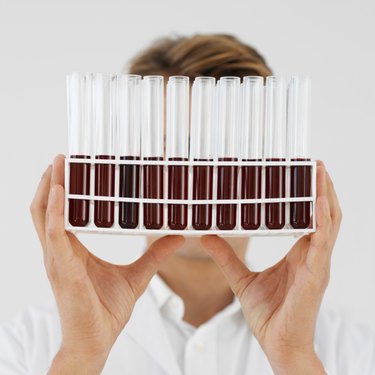
When thinking of joint inflammation and pain, dairy products are not the first cause that comes to mind. If you have a milk allergy, consuming dairy products can cause inflammation and pain to develop in your joints because of increased histamine and other chemicals in the body. Consuming any product that contains dairy can cause inflammation in your joints if you are allergic to milk. If you have arthritis or any other joint condition, talk with your doctor about the possibility of a milk allergy.
Dairy Allergy
Video of the Day

Dairy allergies are caused by an overreaction of the immune system to the whey and casein proteins found in cow's milk. Because your immune system identifies the proteins as dangerous, the body produces immunoglobulin E antibodies, histamine and other chemicals to attack the allergen. These chemicals are created by mast cells in soft tissue areas of your body.
Video of the Day
Joint Inflammation and Pain

Histamine is a chemical that naturally occurs in your body to protect against infection. During an allergic reaction to milk, histamine is created in an excessive amount, which causes inflammation. The tissue between your joints becomes inflamed, placing pressure on the surrounding areas, which causes pain. The Center for Food Allergies states that consuming dairy products can cause an allergic reaction resulting in joint pain a few hours or even a day later. Most other food allergy symptoms appear within minutes of ingesting dairy products.
Identification

Testing will be required to determine if a milk allergy is the cause of your joint inflammation and pain. A small amount of casein and whey proteins will be injected under the surface of your skin. If your skin reacts to the injection with redness, swelling and inflammation you are most likely allergic to the proteins. To confirm the allergy, a sample of your blood will be sent to a lab where the dairy proteins will be injected into your blood. If the lab concludes that your blood reacts by creating IgE antibodies, you will be diagnosed with a milk allergy.
Treatment

Treatment for most joint inflammation and pain is the use of over-the-counter pain relievers, such as ibuprofen or acetaminophen. If you are diagnosed with a milk allergy, the most effective treatment for joint pain and inflammation is to avoid consuming any milk products.
Is this an emergency? If you are experiencing serious medical symptoms, please see the National Library of Medicine’s list of signs you need emergency medical attention or call 911.